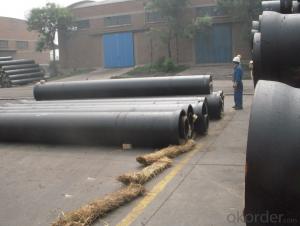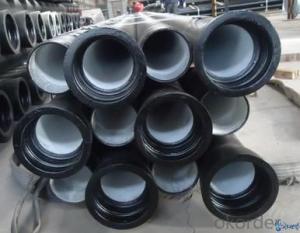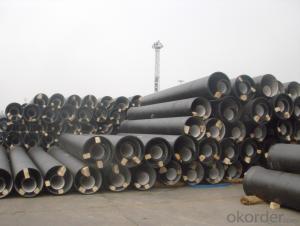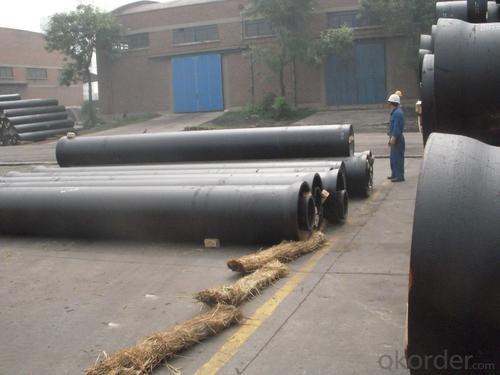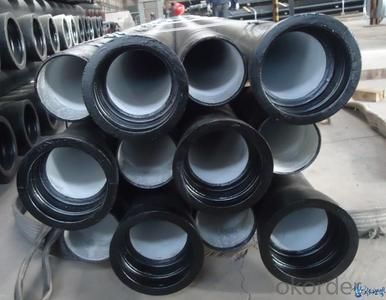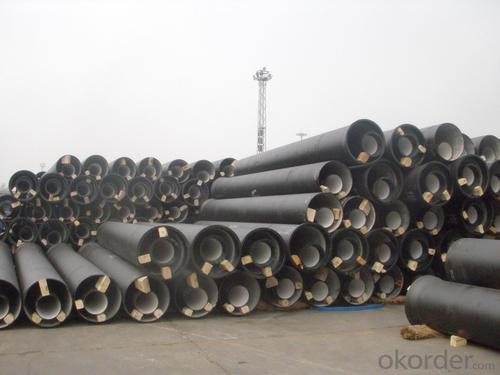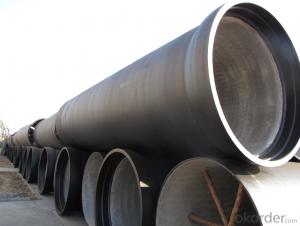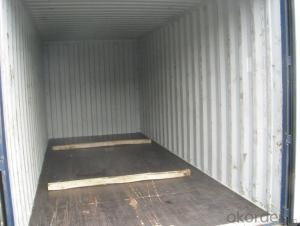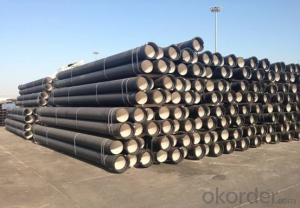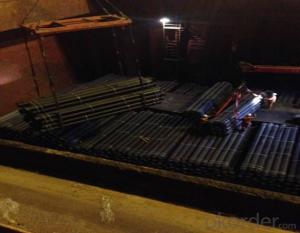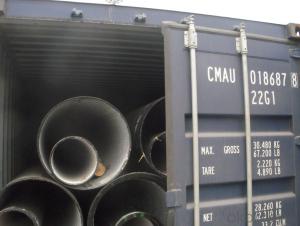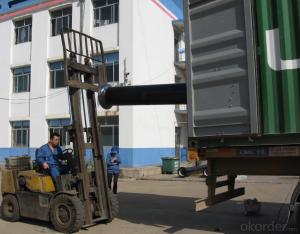DUCTILE IRON PIPES K8 DN1600
- Loading Port:
- China Main Port
- Payment Terms:
- TT OR LC
- Min Order Qty:
- -
- Supply Capability:
- -
OKorder Service Pledge
OKorder Financial Service
You Might Also Like
Ductile Iron Cast Pipe is without any defects compare with tradition casting tech, which has many advantages particularly as follow:
(1) High density. In the "vertical upward casting" process, the melt iron of centre liquid column in center crystallizer is continuously feeding for volume shrinkage caused by condensation tube at outer circumference , which lead to be free of shrinkage porosity.
(2) High purity. When melt iron pouring, the mixed impurities such as gas, dross, sand grain which are lighter than melt iron could be eliminated at furnace mouth, its impossible to enter into the crystallizer through the channel, so the melt iron into the crystallizer is very pure.
(3) Strength with toughness. The cooling speed provided by continuous crystallizer is 30 times than sand casting and 5 times than centrifugal casting, and doesn't produce white iron, the eutectic cell volume of continuous cast iron is one eighth to one tenth compare with traditional cast iron. The density of graphite nodule in ductile iron can reach 300-700 pcs/mm2. Therefore, all reason above improve the strength and toughness of continuous cast iron.
(4) Free machining. The high speed cooling make the hardening phase (such as boride, steadite) not appear like reticular, massive or thick, but diffuse like fish bone and pane in shape, moreover, there are tiny graphite flakes inlaid hardening phase. It's free machining in BrinellHardness the range of 250-300HB. However, the Brinell Hardness of 250 is top limit to common metal materials.
(5) Uniform composition of tube wall. The convection mixing of liquid column caused by marching type drawing in crystallizer make the composition of tube wall well-distributed, and concentration gradient very little.
(6) High productivity. To the wall thickness of tube under 10mm, the speed of continuous casting is 1 meter/min, to the wall thickness of tube under 20mm, the speed of continuous casting is 0.5 meter/min, which is high efficiency that centrifugal or other casting tech couldn't reach.
- Q: What new technologies are there for the installation of ductile iron pipes?
- Because the new flexible interface mechanism of cast iron drainage pipe pipe in the development of China's relatively short history, compared with other drainage pipes, people know little of the present, with some experience of the author in the construction, the application of the performance, characteristics and engineering, to do some simple introduction.
- Q: The role of chromium in nodular cast iron
- In the bending fatigue test of crankshaft, it is also found that the chromium containing cast nodular iron crankshaft has the characteristics of large ultimate bending moment, high safety factor, overload duration, high strength and small deformation.
- Q: What quota can be used for the installation of DN300 ductile iron pipes?
- Moreover, the ball tube is generally 5.5 meters long or 6 meters, if the length of the bridge is too long, to use the casing, the casing must also be fixed, and so on.
- Q: Can ductile iron pipe be used for directional drilling?
- Yes, ductile iron pipe can be used for directional drilling. It is a strong and durable material that can withstand the stresses and forces encountered during directional drilling operations. Its flexibility and resistance to damage make it a suitable choice for this application.
- Q: Are ductile iron pipes suitable for installation in areas with high soil compaction and traffic loads?
- Yes, ductile iron pipes are suitable for installation in areas with high soil compaction and traffic loads. Ductile iron pipes have high tensile strength and are highly resistant to external loads, making them ideal for areas with heavy traffic and compacted soil. They are designed to withstand the pressure and stress caused by the movement of heavy vehicles and the weight of the soil above them. Additionally, ductile iron pipes have excellent flexibility, allowing them to absorb and distribute the load more effectively, reducing the risk of damage or failure. Therefore, they are a reliable choice for installation in areas with high soil compaction and traffic loads.
- Q: How is ductile iron pipe installed?
- Ductile iron pipe is typically installed using the trenchless method, which involves three main steps: preparation, installation, and backfilling. First, the trench is excavated and prepared with a proper foundation for the pipe. Then, the ductile iron pipe is carefully lowered into the trench using specialized equipment and joined together using mechanical joints or flanged connections. Finally, the trench is backfilled with suitable material and compacted to provide stability and support to the installed pipe.
- Q: Can ductile iron pipe be used for irrigation pumping stations?
- Indeed, irrigation pumping stations can utilize ductile iron pipe. This type of pipe finds widespread application, particularly in irrigation systems, owing to its robustness and resilience. Its exceptional tensile strength enables it to endure substantial pressure and weight, rendering it highly suitable for irrigation pumping stations. Furthermore, ductile iron pipe exhibits resistance to corrosion, a desirable trait in the presence of water within irrigation systems. Moreover, its ease of installation and maintenance make it an economical selection for irrigation projects.
- Q: How do ductile iron pipes perform in high-altitude areas?
- Ductile iron pipes perform well in high-altitude areas due to their inherent strength and durability. The properties of ductile iron, including its high tensile strength and impact resistance, make it suitable for withstanding the challenges posed by high-altitude environments. One of the key advantages of ductile iron pipes is their ability to resist internal and external pressures. In high-altitude areas, where water pressure may vary significantly, ductile iron pipes can withstand the changes without compromising their structural integrity. This ensures the reliable and continuous flow of water without the risk of pipe failures or leaks. Ductile iron pipes also exhibit excellent resistance to corrosion, which is crucial in high-altitude areas where the atmospheric conditions can be more harsh and unpredictable. The pipes' protective lining and external coatings provide an additional layer of defense against corrosion, ensuring their longevity and reducing the need for frequent maintenance or replacements. Moreover, ductile iron pipes have a higher tolerance to temperature variations compared to other materials. In high-altitude areas, where temperature fluctuations can be extreme, these pipes can withstand the expansion and contraction without cracking or rupturing. This thermal stability is essential for maintaining the structural integrity of the pipeline system and preventing costly repairs. In summary, ductile iron pipes are well-suited for high-altitude areas due to their strength, durability, resistance to pressure variations, corrosion resistance, and thermal stability. These properties make them a reliable choice for water distribution systems in such environments, ensuring the continuous supply of water without compromising safety or efficiency.
- Q: Are ductile iron pipes suitable for use in mining tailings pipelines?
- Yes, ductile iron pipes are suitable for use in mining tailings pipelines. Ductile iron pipes have excellent strength and durability, making them capable of withstanding the harsh and abrasive conditions often found in mining operations. They have high tensile strength, which allows them to handle the pressure and weight of the tailings material. Additionally, ductile iron pipes have good resistance to corrosion, which is important in a mining environment where the tailings may contain chemicals or other substances that can be corrosive. Furthermore, ductile iron pipes are known for their ease of installation and maintenance, which can be advantageous in mining operations where time is crucial. Overall, ductile iron pipes are a reliable and cost-effective choice for mining tailings pipelines.
- Q: What are the typical joint restraint requirements for ductile iron pipes in seismic zones?
- In seismic zones, the typical joint restraint requirements for ductile iron pipes are designed to ensure the structural integrity and prevent displacement or separation of the pipes during seismic events. These requirements are crucial to maintain the reliability and functionality of the pipeline system. One common joint restraint requirement for ductile iron pipes in seismic zones is the use of flexible or mechanical joint systems. Flexible joints, such as rubber gasket joints, can absorb and accommodate the movement caused by seismic activity. These joints allow for axial movement, angular deflection, and expansion/contraction of the pipes, reducing the risk of pipe failure or damage. Another important requirement is the use of adequate anchoring systems. This involves securing the pipes to the surrounding structures or embedding them in concrete thrust blocks to prevent excessive movement or displacement during seismic events. Anchoring systems help distribute the forces generated by the earthquake and minimize the risk of pipe separation or breaking. Additionally, seismic design standards often require the use of seismic restraints, such as seismic joint restraints or bracing systems, to further enhance the stability and integrity of the ductile iron pipes. These restraints are designed to limit the movement of the pipes in specific directions, reducing the potential for damage and maintaining the overall system performance. It is important to note that the specific joint restraint requirements for ductile iron pipes in seismic zones may vary depending on local building codes, seismic activity levels, and engineering considerations. It is crucial to consult the relevant regulations and work with experienced professionals in the design and installation process to ensure compliance with the necessary requirements for seismic resistance.
Send your message to us
DUCTILE IRON PIPES K8 DN1600
- Loading Port:
- China Main Port
- Payment Terms:
- TT OR LC
- Min Order Qty:
- -
- Supply Capability:
- -
OKorder Service Pledge
OKorder Financial Service
Similar products
Hot products
Hot Searches
Related keywords
